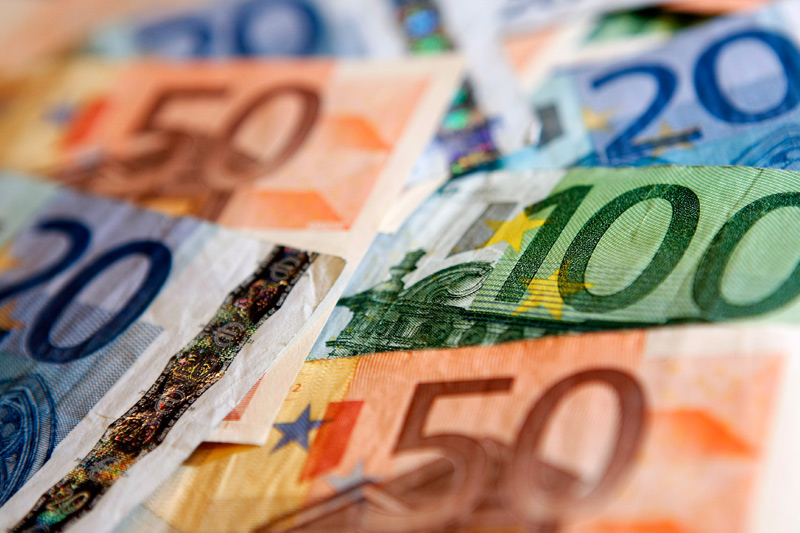Investing.com - The euro was down against the U.S. dollar and the yen on Monday, as doubts over whether an upcoming European Union summit will yield any progress on tackling the region’s debt crisis dampened demand for riskier assets.
During European late morning trade, the euro was weaker against the U.S. dollar, with EUR/USD dropping 0.71% to trade at 1.2481.
Market sentiment soured ahead of an EU summit due to begin on Thursday, amid growing doubts over whether leaders will make any progress towards greater fiscal integration and allowing the bloc's rescue funds to buy government debt.
Meanwhile, fears that the debt crisis in the euro area is creating a drag on global growth continued to weigh, following a string of data last Thursday which pointed to weak U.S. manufacturing activity, a shrinking Chinese manufacturing sector and slowing business activity across the single currency bloc.
Earlier Monday, Spain’s government formally requested aid of up to EUR100 billion for its banking sector from its euro zone partners. Spain’s economy minister said the amount should be enough to cover the needs of all banks and provide an additional security buffer.
The request came after the results of an independent audit last week indicated that Madrid would need a rescue package of as much as EUR62 billion to bailout its banks.
The shared currency was sharply lower against the yen, with EUR/JPY tumbling 1.37% to trade at 99.72, but remained steady against the Swiss franc, with EUR/CHF unchanged on the day at 1.2008.
The single currency was down against the pound, with EUR/GBP shedding 0.48% to trade at 0.8025.
Sentiment on sterling was hit by speculation over more easing from the Bank of England after senior policymaker David Miles said that a "substantial" amount of monetary stimulus was needed to shore-up growth in Britain's "stalled" economy.
In an interview published in the Financial Times earlier, Miles reiterated his support for a GBP50 billion expansion of the BoE’s asset purchase program.
The euro was mixed against the Canadian, Australian and New Zealand dollars, with EUR/CAD losing 0.26% to hit 1.2842, EUR/AUD inching up 0.01% to hit 1.2490 and EUR/NZD dipping 0.01% to hit 1.5897.
Later Monday, the U.S. was to release official data on new home sales.
During European late morning trade, the euro was weaker against the U.S. dollar, with EUR/USD dropping 0.71% to trade at 1.2481.
Market sentiment soured ahead of an EU summit due to begin on Thursday, amid growing doubts over whether leaders will make any progress towards greater fiscal integration and allowing the bloc's rescue funds to buy government debt.
Meanwhile, fears that the debt crisis in the euro area is creating a drag on global growth continued to weigh, following a string of data last Thursday which pointed to weak U.S. manufacturing activity, a shrinking Chinese manufacturing sector and slowing business activity across the single currency bloc.
Earlier Monday, Spain’s government formally requested aid of up to EUR100 billion for its banking sector from its euro zone partners. Spain’s economy minister said the amount should be enough to cover the needs of all banks and provide an additional security buffer.
The request came after the results of an independent audit last week indicated that Madrid would need a rescue package of as much as EUR62 billion to bailout its banks.
The shared currency was sharply lower against the yen, with EUR/JPY tumbling 1.37% to trade at 99.72, but remained steady against the Swiss franc, with EUR/CHF unchanged on the day at 1.2008.
The single currency was down against the pound, with EUR/GBP shedding 0.48% to trade at 0.8025.
Sentiment on sterling was hit by speculation over more easing from the Bank of England after senior policymaker David Miles said that a "substantial" amount of monetary stimulus was needed to shore-up growth in Britain's "stalled" economy.
In an interview published in the Financial Times earlier, Miles reiterated his support for a GBP50 billion expansion of the BoE’s asset purchase program.
The euro was mixed against the Canadian, Australian and New Zealand dollars, with EUR/CAD losing 0.26% to hit 1.2842, EUR/AUD inching up 0.01% to hit 1.2490 and EUR/NZD dipping 0.01% to hit 1.5897.
Later Monday, the U.S. was to release official data on new home sales.
